Filter by

Accommodating the Individual
How did the Greeks respond to the experiences of uncertainty that they so acutely made in the aftermath of Alexander the Great's world-changing conquest of the Persian Empire? How were old values upheld and reshaped? And how did the societies of Greek cities and royal courts accommodate the overwhelming newfound power of Greek individuals? By developing a custom methodology, this book tries to …
- Edition
- -
- ISBN/ISSN
- 9783946317838
- Collation
- oer.unej.ac.id
- Series Title
- -
- Call Number
- -

Translation und Marginalisierung = Intersektionale Perspektiven auf Übersetz…
Übersetzungen spiegeln und bestätigen die Normen der zielkulturellen Mehrheitsgesellschaft und ihrer machthabenden Instanzen, wohingegen Anliegen von Minderheiten meist unberücksichtigt bleiben. Diesen oft übersehenen Zusammenhang zwischen Translation und Marginalisierung leuchtet der interdisziplinäre Open Access-Band für die Frühe Neuzeit systematisch aus und rückt jene Menschen, Figu…
- Edition
- -
- ISBN/ISSN
- 9783662694695
- Collation
- XII, 326 hlm; ill., lamp.,
- Series Title
- -
- Call Number
- -

Aging Gracefully in the Renaissance: Stories of Later Life from Petrarch to M…
In Aging Gracefully in the Renaissance: Stories of Later Life from Petrarch to Montaigne Cynthia Skenazi explores a shift in attitudes towards aging and provides a historical perspective on a crucial problem of our time. From the late fourteenth to the end of the sixteenth centuries, the elderly subject became a point of new social, medical, political, and literary attention on both sides of t…
- Edition
- Volume: 11
- ISBN/ISSN
- 9789004255722
- Collation
- -
- Series Title
- -
- Call Number
- -
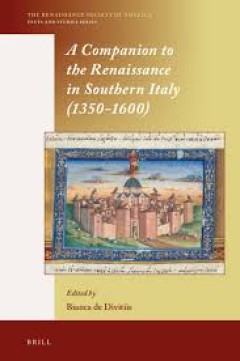
A Companion to the Renaissance in Southern Italy (1350–1600)
A Companion to the Renaissance in Southern Italy offers readers unfamiliar with Southern Italy an introduction to different aspects of the fifteenth- and sixteenth-century history and culture of this vast and significant area of Europe, situated at the center of the Mediterranean. Commonly regarded as a backward, rural region untouched by the Italian Renaissance, the essays in this volume paint…
- Edition
- Volume: 19
- ISBN/ISSN
- 9789004526372
- Collation
- -
- Series Title
- -
- Call Number
- -
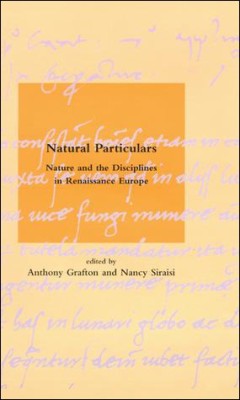
Natural particulars :nature and the disciplines in Renaissance Europe
This volume examines the transformation in ways of studying naturethat took place in Western Europe during the fifteenth and sixteenthcenturies. This volume examines the transformation in ways of studying nature that took place in Western Europe during the fifteenth and sixteenth centuries. Some of the essays trace particular textual traditions, while others follow the development of scholarly…
- Edition
- -
- ISBN/ISSN
- 9780262274210
- Collation
- 1 online resource (xi, 426 pages) :illustrations.
- Series Title
- -
- Call Number
- -
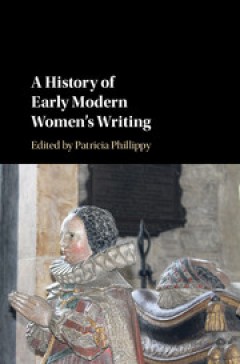
A History of Early Modern Women's Writing
A History of Early Modern Women's Writing is essential reading for students and scholars working in the field of early modern British literature and history. This collaborative book of twenty-two chapters offers an expansive, multifaceted narrative of British women's literary and textual production in the period stretching from the English Reformation to the Restoration. Chapters work together …
- Edition
- -
- ISBN/ISSN
- 9781316480267
- Collation
- -
- Series Title
- -
- Call Number
- -
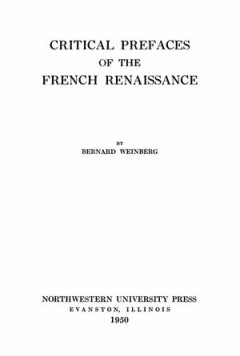
Critical Prefaces of the French Renaissance
Critical Prefaces of the French Renaissance contains nearly 30 prefaces from the works of French poets and dramatists published from 1525 to 1611. Bernard Weinberg’s helpful book collects prefaces from the works of satirical poets, as well as dramatists, and provides a short introduction to each preface setting it in its literary and historical context. Lyrical and satirical poets represented…
- Edition
- -
- ISBN/ISSN
- 9780810138773
- Collation
- 304 halaman
- Series Title
- -
- Call Number
- 800 WEI c
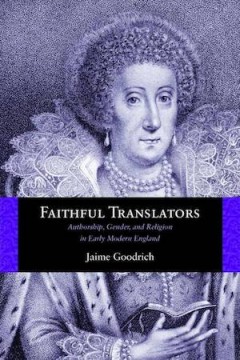
Faithful Translators : Authorship, Gender, and Religion in Early Modern England
With Faithful Translators Jaime Goodrich offers the first in-depth examination of women's devotional translations and of religious translations in general within early modern England. Placing female translators such as Queen Elizabeth I and Mary Sidney Herbert, Countess of Pembroke, alongside their male counterparts, such as Sir Thomas More and Sir Philip Sidney, Goodrich argues that both male …
- Edition
- -
- ISBN/ISSN
- 9780810129696
- Collation
- -
- Series Title
- Rethinking the Early Modern
- Call Number
- 400 GOO f
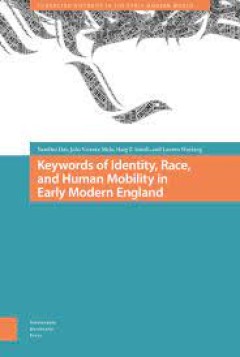
Keywords of Identity, Race, and Human Mobility in Early Modern England
What did it mean to be a stranger in sixteenth- and seventeenth-century England? How were other nations, cultures, and religions perceived? What happened when individuals moved between languages, countries, religions, and spaces? Keywords of Identity, Race, and Human Mobility analyses a selection of terms that were central to the conceptualisation of identity, race, migration, and transcultural…
- Edition
- -
- ISBN/ISSN
- 9789048552283
- Collation
- 358 halaman
- Series Title
- Connected Histories in the Early Modern World
- Call Number
- 305 DAS k
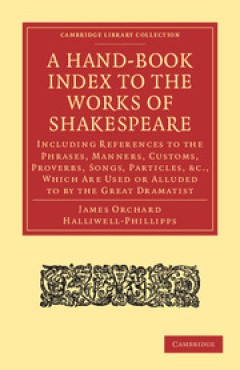
A Hand-Book Index to the Works of Shakespeare
Published in 1866, this is a meticulous, encyclopaedic listing of almost every word, place and character in Shakespeare's works. A must-have for every student of English literature, it is also an unparalleled guide for those left in the dark by Shakespearean English. James Orchard Halliwell-Phillipps (1820–1889), a renowned scholar, antiquarian, and collector of books on Shakespeare, provided…
- Edition
- -
- ISBN/ISSN
- 9780511693045
- Collation
- -
- Series Title
- Cambridge Library Collection - Literary Studies
- Call Number
- -
 Computer Science, Information & General Works
Computer Science, Information & General Works  Philosophy & Psychology
Philosophy & Psychology  Religion
Religion  Social Sciences
Social Sciences  Language
Language  Pure Science
Pure Science  Applied Sciences
Applied Sciences  Art & Recreation
Art & Recreation  Literature
Literature  History & Geography
History & Geography